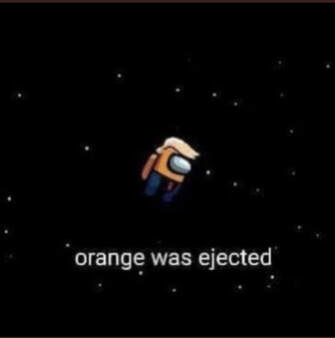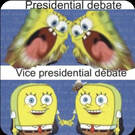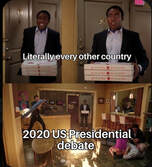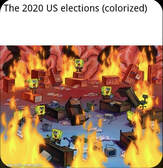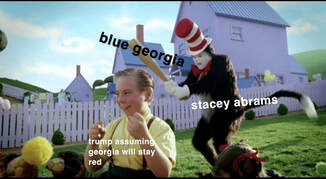"using memes as a vehicle for engaging with politics does not mean that young people are not as capable of having these conversations, they have just created a language that is more digestible." -- Judith Hernandez, 11th Grade
The US experienced the 2020 election amidst a pandemic making social media and meme sharing an even more important outlet for communicating one's emotions and opinions. This is especially true for young people who often depend on social media to get involved in bigger political discussions that they may not always feel welcomed in. This can often make adults think that young people are less knowledgeable. However, using memes as a vehicle for engaging with politics does not mean that young people are not as capable of having these conversations, they have just created a language that is more digestible.
Before election night on November 3rd, people were already creating memes and posting them on their social media accounts. A lot of them were about the presidential and vice presidential debates which stirred up many conversations, made some laugh, and made others more fearful than they already were.
Before election night on November 3rd, people were already creating memes and posting them on their social media accounts. A lot of them were about the presidential and vice presidential debates which stirred up many conversations, made some laugh, and made others more fearful than they already were.
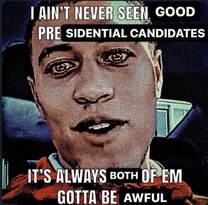
While some of these memes are self explanatory, others are more like inside jokes young people have created. Unless you are active on Tik Tok, Twitter, or Instagram, you probably won’t understand the joke behind this meme (right side) or even realize there is one because of how memes build off of each other. However, it’s less about the origin of the joke and more about the way youth are using it to get their message through to other young people.

Most of the memes are making light of the fear, anxiety, and stress the election has caused. For example, the meme on the right is expressing the exhaustion many are facing due to having to deal with “historical moments” since the beginning of 2020 such as a pandemic, virtual learning, local fires, and more. It is the same feeling many are expressing through art, journalism, protests, and political organizing only it’s encapsulated in a meme.
On the actual night of the election, even more memes were shared. Most of them were a general reaction to the chaos of it all. For example, both presidential candidates this year had their own set of problematic histories but supporters on both sides strongly believed their candidate was the right choice. This created tension between democrats and republicans and an overall worry on how the results would impact the future of the U.S. This tension grew when results didn’t come in on November 3rd.
Additionally to an overall reaction to the election, there were other memes created to capture some important moments that occurred. An example is Georgia turning blue for the first time in a presidential election since 1992 due to the leadership and power of Stacey Abrams and other Black organizers.
In an interview shortly before the election, Stacey Abrams said, “Georgia has had the potential for years… It didn’t just start this cycle. This has been work that’s been ongoing for nearly a decade, and i”m just proud to see it come to fruition and for it to finally receive the level of investment it deserves.” While memes and other social media posts can’t articulate the credit Abrams deserves or accurately demonstrate the amount of work she’s done along with other activists, they do make others aware of who she is through meme’s great strength: the power of image and metaphor.
In an interview shortly before the election, Stacey Abrams said, “Georgia has had the potential for years… It didn’t just start this cycle. This has been work that’s been ongoing for nearly a decade, and i”m just proud to see it come to fruition and for it to finally receive the level of investment it deserves.” While memes and other social media posts can’t articulate the credit Abrams deserves or accurately demonstrate the amount of work she’s done along with other activists, they do make others aware of who she is through meme’s great strength: the power of image and metaphor.
On November 7th, four days after election night, Joe Biden was elected for president. This led to celebration, sadness, and fear.
In a podcast for The New York Times titled “Celebration and Sorrow: Americans react to the Election,” we hear voters explain their reactions to the election results. One Biden supporter says, “You can’t really explain how it feels to be a Black woman and feel like you can finally see yourself in politics. Like, you see so many young women in Kamala.” Another supporter adds on, “I have little cousins, little Black girls, and they can look up to her and realize that they can be vice president. They can be president. They can be whatever they want to be.”
Other Biden supporters are simply laughing at Trump’s loss by making memes to make fun of him and his supporters.
In comparison, Trump supporters are not accepting his loss and instead are saying Biden’s win is voter fraud. One Trump supporter explains, “The fact that people are seeming to be not concerned at all with the possibility that malfeasance has occurred is what makes me sad. I mean, I’m just seeing a real lack of critical thinking in so many people. I just want fairness, and I want to know my vote counted.”
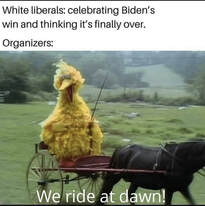
Others are briefly cheering about Trump’s loss but are preparing to continue organizing for better in the next four years. “This is just the beginning of change and the election of any one administration does not mean the work is done” explains civil rights leader, Martin Luther King III.
This year, the U.S has experienced many unprecedented changes and events. Everyone has an opinion on everything going on and so much information is being shared all the time. Images and metaphors help convey the larger messages many are trying to convey.
